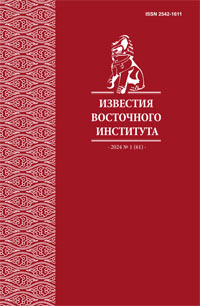The Phenomenon of Ethnocultural Enclaves of Russophone Koreans "Koryŏin Maŭl" in South Korea
DOI:
https://doi.org/10.24866/2542-1611/2024-1/51-63Keywords:
South Korea, Koryo-saram, Koryŏin Maŭl, ethnocultural enclave, labor migration, foreign compatriotsAbstract
This article details the findings of a study conducted from October 2022 to December 2023 on the ethnocultural enclaves of Russophone Koreans in South Korea. The research delves into the historical origins of
the term "Koryŏin Maŭl" proposes a refined definition. It identifies key characteristics shared by these enclaves and introduces a preliminary classification scheme. Distinguished by a strong ethnic presence and a somewhat insular community formed around a common language (Russian) and shared cultural practices, the "Koryŏin Maŭl" can be defined as ethnocultural enclaves. These areas are self-determined and universally recognized among their residents.
Through my research, I have concluded that the "Koryŏin Maŭl" I studied share a number of common characteristics. They all have distinct boundaries, formed by both terrain features and patterns of residential development. These neighborhoods also house a significant number of ethnic businesses, whose success largely hinges on the customer base formed within the ethnic enclave itself.

